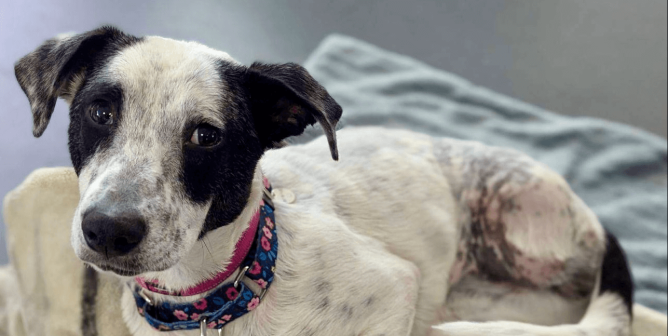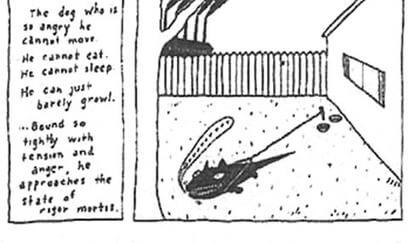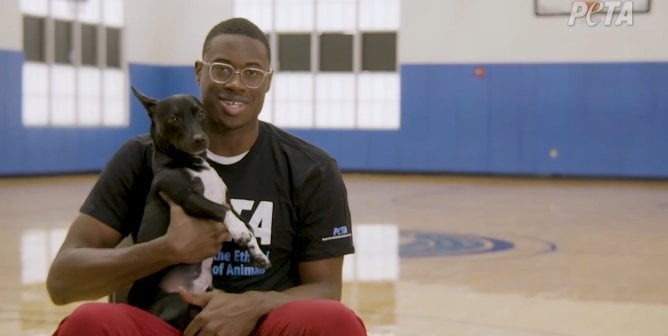Today is the first day back to school for all the kids in the vicinity of PETA’s headquarters, and many dogs will suddenly find themselves all alone after a summer of companionship. According to the article, this is especially upsetting to dogs when the parents in the family are teachers because they’ve been home all summer too, and suddenly they’re gone as well.
And if the kids are going off to college in another town or state, it’s even worse since they won’t even be home in the evenings.
I think a lot of people don’t give this much thought, and then they wonder why their dogs suddenly start acting out by chewing up furniture, barking excessively, or even becoming withdrawn or irritable. Do they think their dogs are automatons with no feelings? I have witnessed a few situations in which dogs have become depressed by someone’s absence, and I have to say that it was heartwrenching.
In one case, a roommate of mine had developed a very close bond with my late Doberman, Shandy, and after he moved out, Shandy used to watch the door every evening, waiting and waiting for the roommate to come home. This went on for weeks, and it just broke my heart. No, dogs definitely have intense feelings. They just can’t articulate them to us, just like children, people with autism, and a lot of other people of few words!
And while we’re on the subject of being sensitive to dogs’ feelings, here’s a little more food for thought: An article by the BBC last week, called “Hurt Feelings ‘Worse Than Pain,’” describes research indicating that psychological pain can linger and haunt us much longer and more intensely than physical pain. Although the article is about humans, I have no doubt that the findings would apply to dogs just as easily.
Apparently, as our cerebral cortex evolved to help us “work better in groups or societies,” it also had the “unintended effect of allowing humans to relive, re-experience and suffer from social pain,” whereas the memory of physical pain, which is processed in a different part of the brain, tends to fade with time.
As pack animals, dogs certainly evolved to work better in groups, too, so they likely evolved this same trait, the ability to relive psychological pain. As we know, this type of pain can lead to depression and anxiety. If anyone doesn’t believe that dogs can suffer from these, they don’t know dogs.
My dog Dexter came to me four years ago filled with anxiety. As he relived whatever psychological pain had been inflicted on him by his original owner, he would chew the tip of his tail bloody every single day. This went on for a month before the bad memories finally began to loosen their grip on him. So dogs need to be treated with care and consideration for their physical and their psychological well-being.
I would suggest the following ground rules for respecting a dog’s psyche:
1. Never yell at Fido, unless he’s in imminent danger of being hurt by a falling object or some other hazard.
2. Never threaten Fido: Feeling safe is the bedrock of psychological well-being.
3. Never tease or make fun of Fido. Dogs usually don’t understand that type of humor anyway, but regardless of whether Fido gets the joke, allowing yourself to deprecate him can have a subtle but negative effect on your view of him and, thus, on your relationship.
4. Never leave Fido alone for long periods of time. If you can’t be with him, then provide another form of companionship, such as an animal companion or regular visits by a trusted neighbor or friend.
5. If you must leave Fido alone, provide for all his needs: a comfortable environment (a cozy dog bed or the family couch, soft classical music on the radio), mental stimulation (windows to look out of, interactive toys such as a Kong filled with peanut butter), physical activity (a long walk in the morning, the run of the house?never lock Fido inside a crate!), and the means to relieve himself (a doggie door into a secure back yard or kennel, a doggie litterbox, newspapers, or someone to let him out).
6. Notice which people and animals Fido loves and give him ample opportunity to spend time with them, even if you don’t like them yourself. Make arrangements to meet at the dog park or have them over to your home for a play date. Fido can’t make these arrangements, so it’s up to you to fulfill his longing to hang with his buds.
7. Always keep Fido in mind when life-changing events are imminent. A change in schedule, a change in household members, a move to a new home, these are all huge to him. So try to look at the situation from his point of view and figure out ways to make these changes as low-stress as possible. Remember, Fido is only on this Earth for a limited amount of time when he’s in his twilight years, you don’t want to have to look back on his life and say, “I wish I had treated him better!”
Text VEG to 73822 to get the latest vegan lifestyle tips, recipes, and urgent action alerts texted right to your phone.
Terms for automated texts/calls from PETA: https://peta.vg/txt. Text STOP to end, HELP for more info. Msg/data rates may apply. U.S. only.








